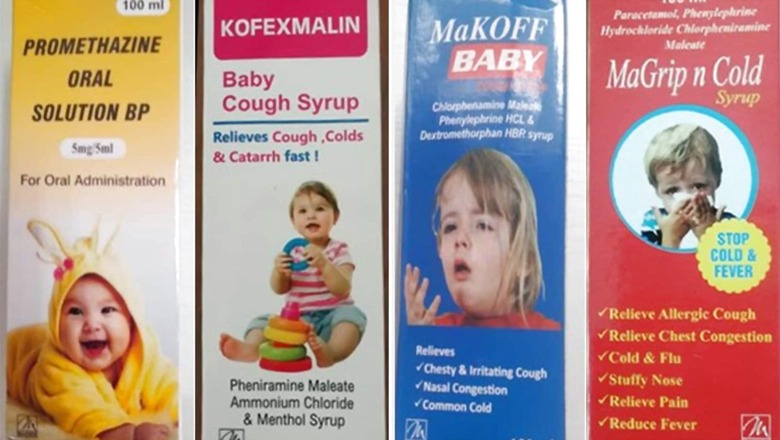Health Matters | India Bashing WHO on Cough Syrup Fiasco is Old Tale of Pot Calling the Kettle Black

views
The news came not just as an allegation but as a damning claim, considering that India holds the reputation of “pharmacy to the world” for the last many decades.
According to WHO, laboratory analysis of the syrups confirmed “unacceptable” amounts of Diethylene Glycol and Ethylene Glycol — which can be toxic and lead to acute kidney injury — in four cough syrup brands identified as Promethazine Oral Solution, Kofexmalin Baby Cough Syrup, Makoff Baby Cough Syrup, and Magrip N Cold Syrup.
As the announcement spread like wildfire, I also started meeting various officials in the Central Drugs Standard Control Organisation (CDSCO) and the Ministry of Health and Family Welfare. While they all gave me bits and pieces of what their departments are planning to do, the overall feeling was of WHO being in “revenge mode” against India.
Many experts on social media platforms defended the reputation of Indian pharma by blaming WHO for its assertive announcement.
“India did not spare WHO on its Covid-19 death count. Now, WHO won’t spare India. Maiden is a fair scapegoat as the company has a controversial past,” a government official, who holds a significant position, told me.
A former drug regulator, who has dealt with Maiden pharma’s compliance issues for a long time, said: “The entire Gambian media was blaming E Coli for the deaths and WHO suddenly chose Maiden. Gambian media was not crying foul play by the Indian manufacturer but WHO did. I trust no one – neither WHO nor Maiden.”
He said that The Gambia blamed the death on the E Coli outbreak after they witnessed the worst flash floods. Even the Gambian minister in a presser said the pattern of deaths is same as in previous years.
So, overall, there are two theories behind the entire episode. One, WHO is framing India. Second, India needs to pull up its Good Manufacturing Practice (GMP) compliance practices and fix the long-pending regulatory gaps.
While I’m not sure about the first one, the second certainly needs work. Here’s why.
Maiden was breaching even basic manufacturing practices
The WHO informed the Indian government on September 29 and launched an investigation, later issuing a show-cause notice.
What the regulators found during the inspection contradicts the assumptions of all those who thought it is a “larger conspiracy”.
First, the regulators found that batch numbers, expiry and manufacturing dates, and the name of the manufacturer were missing from the invoices for propylene glycol, an ingredient used in cough syrups that were allegedly contaminated with life-threatening amounts of toxic Diethylene Glycol and Ethylene Glycol.
Second, they also found that Maiden Pharma has not performed the quality testing of propylene glycol for Diethylene Glycol and Ethylene Glycol presence. How can a firm manufacturing medicines for children not perform such crucial tests?
Third, the firm failed to produce the log books of equipment and instruments regarding manufacturing and testing for the drugs in question.
Fourth, Maiden had not performed process validation and analytical method validation for the drug products of these four cough syrups. Issues with the stability study of the four cough syrups were also detected.
All four points indicate that the firm was not meeting even basic requirements, forget high-quality manufacturing standards.
The firm had submitted accelerated stability study data while seeking marketing authorisation and it has now become evident that the data submitted was being fudged.
“Given the seriousness of contraventions observed during the investigation and its potential risk to the quality, safety and efficacy of the drugs being produced, all the manufacturing activities of the firm are being stopped with immediate effect…,” said the report submitted by state drug controller officer of Haryana, Rakesh Dahiya.
Maiden has been a habitual offender. Various media reports have shown that Kerala and Gujarat authorities have found its products to be of substandard quality multiple times in 2015, 2021 and 2022.
Not only WHO, but all those who point to our gaps are at fault?
Since 2013, US Food and Drug Administration (US FDA) — which is known as the world’s most stringent regulator — started slapping multiple Indian pharma companies with import alerts and bans, which the industry labeled as a “witch hunt”.
In 2019, the American healthcare regulator issued a record number of 23 warning letters. From spotting “live moths” in raw materials, and finding “bacteria-contaminated water” in the manufacturing process to unearthing ‘shredded’ records of quality control, the FDA found several reasons to blame Indian drug makers until the Covid-19 outbreak hit the globe and surprise checks and audits were halted.
India must start upping its drug manufacturing standards and fix flaws in the drug regulatory system which allows the scope of such errors instead of blaming the informer.
This is not the first time India has faced controversy due to Diethylene Glycol and Ethylene Glycol (DEG). In 2020, Himachal Pradesh-based pharma company Digital Vision produced DEG-laced cough syrups that killed 12 infants.
Here, WHO or any other health regulator was not involved as it was a domestic issue and hence, we had no one to pass on the blame to or create conspiracy theories.
All the conspiracy theories remind me of the popular Hindi phrase “Ulta chor kotwal ko daante” or “pot calling the kettle black”.
Read all the Latest News India and Breaking News here


















Comments
0 comment